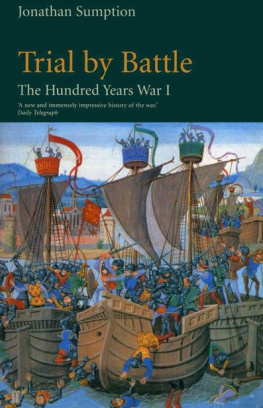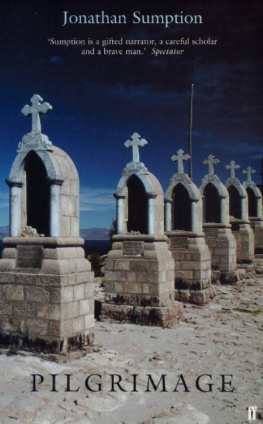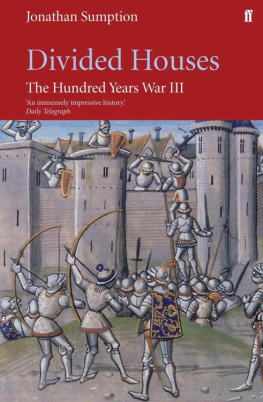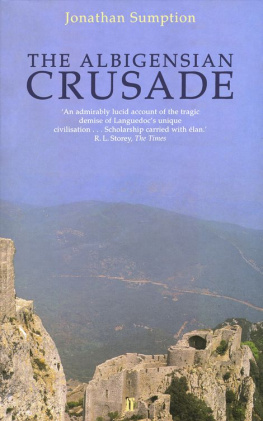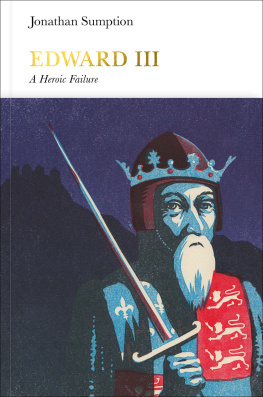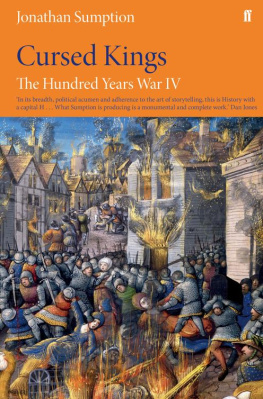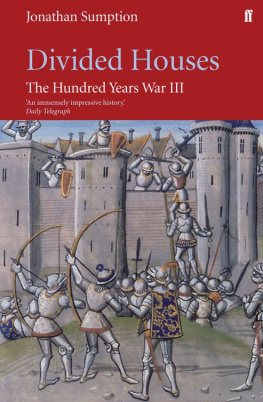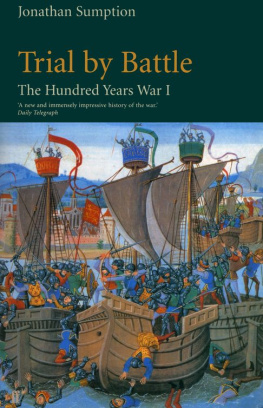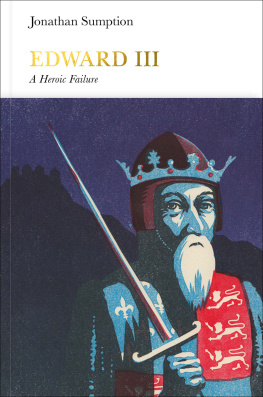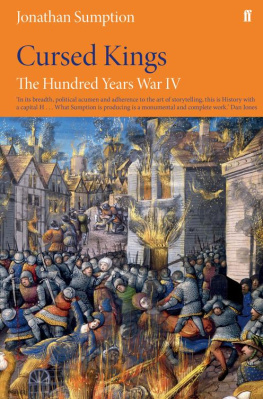Jonathan Sumption - The Hundred Years War
Here you can read online Jonathan Sumption - The Hundred Years War full text of the book (entire story) in english for free. Download pdf and epub, get meaning, cover and reviews about this ebook. year: 1991/2009, publisher: Faber and Faber/University of Pennsylvania Press, genre: History. Description of the work, (preface) as well as reviews are available. Best literature library LitArk.com created for fans of good reading and offers a wide selection of genres:
Romance novel
Science fiction
Adventure
Detective
Science
History
Home and family
Prose
Art
Politics
Computer
Non-fiction
Religion
Business
Children
Humor
Choose a favorite category and find really read worthwhile books. Enjoy immersion in the world of imagination, feel the emotions of the characters or learn something new for yourself, make an fascinating discovery.

- Book:The Hundred Years War
- Author:
- Publisher:Faber and Faber/University of Pennsylvania Press
- Genre:
- Year:1991/2009
- Rating:3 / 5
- Favourites:Add to favourites
- Your mark:
- 60
- 1
- 2
- 3
- 4
- 5
The Hundred Years War: summary, description and annotation
We offer to read an annotation, description, summary or preface (depends on what the author of the book "The Hundred Years War" wrote himself). If you haven't found the necessary information about the book — write in the comments, we will try to find it.
The Hundred Years War — read online for free the complete book (whole text) full work
Below is the text of the book, divided by pages. System saving the place of the last page read, allows you to conveniently read the book "The Hundred Years War" online for free, without having to search again every time where you left off. Put a bookmark, and you can go to the page where you finished reading at any time.
Font size:
Interval:
Bookmark:
To Bernard
Inthetext
Attheend
At most times, war has been the principal collective enterprise of mankind. It has given human societies their identities. It has shaped their institutions, and provided the ultimate test of their solidity. This volume tells the story of a prolonged crisis in the affairs of France, the richest and most advanced society of late medieval Europe, which had in a real sense been formed by war and in the 1350s was almost destroyed by it. The strain of continual invasion, the financial and economic problems of defence, the shock of a grave and unexpected defeat in battle, combined for a brief period to bring the French state to the verge of extinction and to dissolve bonds of civil society which men had taken for granted for more than a century. As at similar crises in the history of France, in 1792 and 1870, these events were accompanied by savage recriminations among Frenchmen: venomous argument in elected assemblies; an unsuccessful revolution in Paris and another among the peasant communities of the north.
The main theme of this volume, however, is not destruction but survival. Stable communities are remarkably resilient in the face of catastrophe. The cities and rural communities of France survived, damaged and impoverished but intact, to undo most of Edward IIIs work in the following generation. There is no symmetry in war, and although France was defeated, England was not victorious. The English achieved a brief and flattering peace, which lasted for just nine years in the 1360s. They did this not by sustained military pressure, but by capturing the King of France, John II, who was able to impose it on his subjects. Englishmen and Gascons caused immense destruction in the territory of France, but they conquered very little of it. They crashed like great waves over the country, then ebbed away. They lacked the administrative and financial resources to impose a thorough-going occupation, something that only the police states of the nineteenth and twentieth centuries have been able to achieve, and then only for short periods.
These events were recorded by those who lived through them in some of the most vivid narratives to survive from the medieval period. As the English chronicle tradition faded, the French one came into its own. Pierre dOrgement (or whoever else wrote the continuation of the GrandeschroniquesdeFrance) lived through the Parisian revolution of tienne Marcel as one of the Dauphins entourage, and described it in language which loses nothing by its laconic, passionless style. Jean de Venette witnessed the same events as a resident of the city. The Castilian chronicler Ayala had served both rivals for his countrys crown and commanded a division in the disastrous battle of Njera. The Northumberland chronicler Thomas Gray of Heton fought in Scotland and the poet Chaucer in France.
For all their literary qualities, however, these sources need to be approached with the same caution which one brings to reading newspaper accounts of modern wars. Those who work daily in the law courts will know how fallible even eye-witnesses can be. To write the history of the fourteenth century from Froissarts elegant but muddled and inaccurate chronicle, as some nineteenth-century historians tried to do, would be absurd. One might as well use Shakespeare, or indeed Donizetti. The present volume is based primarily on the record sources, printed and unprinted, of England, Scotland and France, and on those of the Papacy and the Spanish kingdoms. Some of these convey the atmosphere of these appalling years with as much dramatic intensity as the most colourful chronicles. The French chancery registers, for example, in which ordinary Frenchmen confessed their misdeeds to the state in order to be pardoned, provide countless miniature autobiographies in which the war can be seen through the eyes of its lesser actors and victims.
In these and other respects, the principles on which this history is written were explained in the preface to the first volume, published in 1990, and have not changed.
J.P.C.S.
Greenwich
April 1998
The rain fell in England throughout the summer of 1348 as, amid a landscape of mud and flattened grain, men celebrated a decade of war and three years of victory. In a succession of opulent tournaments in the spring at Reading, Bury St. Edmunds,
Perhaps they did not. When, at Windsor some six weeks later, Edward
Beyond his realm Edwards reputation had
Some of these men believed that Edward III had only to press his advantages in order to achieve complete victory. Yet, between the truce of Calais in September 1347 and the autumn of 1355, a period of eight
Behind this unaccustomed financial prudence lay Edward IIIs growing awareness of the limits of his realms resources and the difficulty
Honisoitquimalypense. The phrase, which was coined in about 1348, is more likely to have referred to Edwards war aims and their critics than to any ladys garter. Yet those aims were as enigmatic as his famous motto. All that can be said with confidence is that his ambitions were smaller than his claims. Edward had claimed the Crown of France since 1340, but whenever he was strong enough to bargain with his adversary on something like equal terms he was always ready to trade his claim for territory. How much territory depended on the military situation of the moment. The least that Edward was ever willing to accept was the whole of the duchy of Aquitaine as it had stood on the death of his grandfather in 1307. This meant not only the Bordelais, the Landes and the valley of the Adour and its tributaries, but also Saintonge, southern Prigord and the Agenais. If he could get it he wanted more: Quercy and the Rouergue; Poitou; the Limousin, which Edward I had briefly won and lost at the end of the thirteenth century; the provinces of Anjou and Maine in the western Loire; Brittany; even Normandy; in fact the whole tract of western France which the Angevin dynasty had ruled at the height of its power in the twelfth century. Moreover, the status of this territory was at least as important as its extent. Whatever Edward gained had to be held in free sovereignty, quit of the residual obligations to the French Crown which even the Angevins had acknowledged. This much is clear from the hints that Edwards ambassadors had let slip in the interminable and frustrating diplomatic conferences in the papal palace at Avignon in 1344 and from the loud assertions of Henry of Lancaster in the same place ten years later.
Even in the aftermath of Edwards greatest victories, in 1346 and 1356, it is unlikely that he expected to be King of France. The claim to the French throne was a bargaining counter, a device for achieving a satisfactory settlement when the time was right, and a means of causing embarrassment to the Valois Kings. Edward was enough of a realist to know this. But he also knew that he could not admit it. To acknowledge that his royal title was no more than the prelude to crude horse-trading would have destroyed its practical value. So the King said nothing, refusing to disclose what he wanted except at moments when it seemed attainable. The disasters of the 1330s had taught him patience, and experience brought him a better understanding of his enemies than they ever had of him. He rarely negotiated from a position of weakness, always preferring to temporise, to wait for another year, another campaign, another ally. He took refuge in truces, preserving his conquests, gaining time, gathering his limited resources for a better day.
In France, the failures of the past decade had been received with incomprehension, frustration and finally with unconcealed fury. When the Estates-General opened in Paris on 30 November 1347, the purpose of the meeting was to canvass opinion as to how the war should be prosecuted and to prepare the ground for further heavy taxation to pay for it. But when Philip VIs ministers had made their opening speeches and the assembled representatives withdrew to consider their opinions among themselves, there were loud mutterings and angry proposals for reforming the government. They hardly troubled to hide their feelings behind the courtly convention which attributed a kings every error to his advisers. They blamed the King himself.
Font size:
Interval:
Bookmark:
Similar books «The Hundred Years War»
Look at similar books to The Hundred Years War. We have selected literature similar in name and meaning in the hope of providing readers with more options to find new, interesting, not yet read works.
Discussion, reviews of the book The Hundred Years War and just readers' own opinions. Leave your comments, write what you think about the work, its meaning or the main characters. Specify what exactly you liked and what you didn't like, and why you think so.

